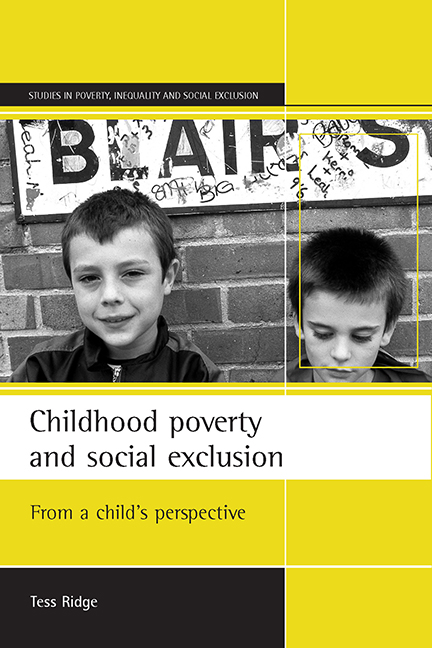Book contents
- Frontmatter
- Contents
- List of tables and figures
- Acknowledgements
- one The challenge of child poverty: developing a child-centred approach
- two What do we know about childhood poverty?
- three Children’s access to economic and material resources
- four ‘Fitting in’ and ‘joining in’: social relations and social integration
- five Family life and self-reflection
- six Experiences and perceptions of school: analysis of the BHPYS data
- seven Childhood poverty and social exclusion: incorporating children’s perspectives
- References
- Appendix BHPYS Wave 7
- Index
two - What do we know about childhood poverty?
Published online by Cambridge University Press: 20 January 2022
- Frontmatter
- Contents
- List of tables and figures
- Acknowledgements
- one The challenge of child poverty: developing a child-centred approach
- two What do we know about childhood poverty?
- three Children’s access to economic and material resources
- four ‘Fitting in’ and ‘joining in’: social relations and social integration
- five Family life and self-reflection
- six Experiences and perceptions of school: analysis of the BHPYS data
- seven Childhood poverty and social exclusion: incorporating children’s perspectives
- References
- Appendix BHPYS Wave 7
- Index
Summary
To develop a child-centred understanding of childhood poverty it is necessary to have some insight into how children in poverty have been represented and treated over time. This chapter is concerned with exploring representations and perceptions of child poverty and it begins with a brief historical overview, tracing how our understanding and knowledge of childhood poverty has grown and changed during the last century. In doing so it examines historical and contemporary representations of children in poverty from a child-centred perspective and takes a comparative look at the UK in relation to the European Union and the rest of the ‘developed’ world. The chapter continues with an exploration of the current situation of children from low-income families in the UK, and identifies some of the key risk factors that affect children's vulnerability to experiencing episodes of poverty. It also takes a critical childcentred look at the current policy responses to childhood poverty and their implications for children's lives.
An historical overview of childhood poverty in the UK
Throughout history, children have rarely featured in contemporary accounts; representations of childhood as a lived experience are remarkably absent. In particular, the voices of children living in poverty have rarely been heard. As Laslett (1971) points out, in the pre-industrial world there were children everywhere, and yet “these crowds and crowds of children are strangely absent from the written record” (1971, p 110). As we move towards the 20th century our perceptions and understandings of children and childhood are informed largely by paintings, poetry and fiction; idyllicised accounts of particular representations of childhood. The autobiographical accounts that survive are largely reflexive and involve adult memories of past childhoods, rather than any contemporaneous accounts of childhood and the experiences of poverty. Due to the growing tradition of working class and feminist oral history, many voices are now being heard that would otherwise have previously been lost. These accounts have given us a rich and valuable insight into the world of the child, particularly through life in the late 19th and early 20th centuries (see Thompson, 1981; Vincent, 1981; Burnett, 1982; Davin, 1996). Yet autobiographies are never completely representative of the whole society, and the poorest classes are the least represented (Burnett, 1982).
- Type
- Chapter
- Information
- Childhood Poverty and Social ExclusionFrom a Child's Perspective, pp. 13 - 36Publisher: Bristol University PressPrint publication year: 2002



